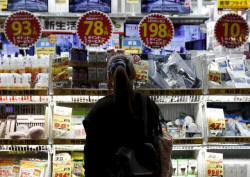|
 Japan
consumer inflation flat, keeps BOJ under pressure Japan
consumer inflation flat, keeps BOJ under pressure
 Send a link to a friend
Send a link to a friend
[March 25, 2016]
By Leika Kihara
TOKYO (Reuters) - Japan's consumer
inflation was flat in the year to February as low energy costs and weak
consumption put a lid on price growth, government data showed on Friday,
keeping the central bank under pressure to top up stimulus although it
eased policy less than two months ago.
|
|
 A separate BOJ index calculated by the central bank to strip out the
effects of energy and fresh food prices showed consumer inflation at
1.1 percent in the year to February, unchanged from January. A separate BOJ index calculated by the central bank to strip out the
effects of energy and fresh food prices showed consumer inflation at
1.1 percent in the year to February, unchanged from January.
The data reinforces a dominant market view that the Bank of Japan
will be forced to cut its inflation forecasts and push back the
timing for hitting its 2 percent price target at a quarterly review
of its projections next month.
"Japan won't see inflation hit the BOJ's target in the next few
years," said Koya Miyamae, senior economist at SMBC Nikko
Securities.
"The BOJ is falling into a vicious cycle in which it remains under
pressure for further easing even as it has few effective policy
means available," he said.
The government's core consumer price growth calculation for Tokyo,
considered a leading indicator of nationwide prices, marked the
biggest annual drop in nearly three years in March, suggesting that
inflation will remain subdued on weak demand as the world's
third-largest economy skirts recession.

Tokyo's core CPI fell 0.3 percent in the year to March, the first
time it dropped by as much since April 2013 and bigger than a median
market forecast for a 0.2 percent decrease.
The nationwide core consumer price index (CPI), which includes oil
products but excludes volatile fresh food prices, was unchanged in
February from a year earlier, government data showed on Friday.
That compared with a median market forecast of a 0.1 percent
increase and followed flat growth marked in January.
CHEAPER BEEF RICE BOWLS
Continued declines in fuel costs were mostly behind the subdued
inflation with a 10.9 percent drop in energy costs offsetting
moderate price rises for items such as processed food, hotel rooms
and television sets.
But some analysts say weak household spending is prompting some
companies to hold back on raising prices, or even cut them, to lure
consumers who have seen wages barely rise.
[to top of second column] |

Last year, a budding economic recovery had allowed restaurant chains
to raise the prices of their "gyudon" beef rice bowls - once a
symbol of Japanese deflation because intense competition kept their
prices so low.
But they are once again starting to offer discounts, including
restaurant chain Sukiya, which extended a campaign offering the rice
bowls 1.6 percent cheaper than usual.
If such competitive measures spread, it could threaten the BOJ's
efforts to nudge households into spending more readily because they
expect prices will soon rise.
The BOJ stunned markets in January by adopting negative interest
rates to prevent slowing overseas growth and volatile financial
markets from derailing a fragile economic recovery.
But the move has failed to boost stock prices and corporate
sentiment has soured since then as exports have taken a hit from
soft emerging market demand.
When the BOJ deployed its massive asset-buying program in April
2013, it pledged to achieve 2 percent in roughly two years. With
inflation stalled three years into the commitment, the central bank
has repeatedly pushed back the timeframe for hitting its target -
including at its January meeting.
It now expects inflation to hit 2 percent around the first half of
fiscal 2017, six months later than the timing it projected last
October.
(Reporting by Leika Kihara; Editing by Eric Meijer)
[© 2016 Thomson Reuters. All rights
reserved.] Copyright 2016 Reuters. All rights reserved. This material may not be published,
broadcast, rewritten or redistributed.
 |